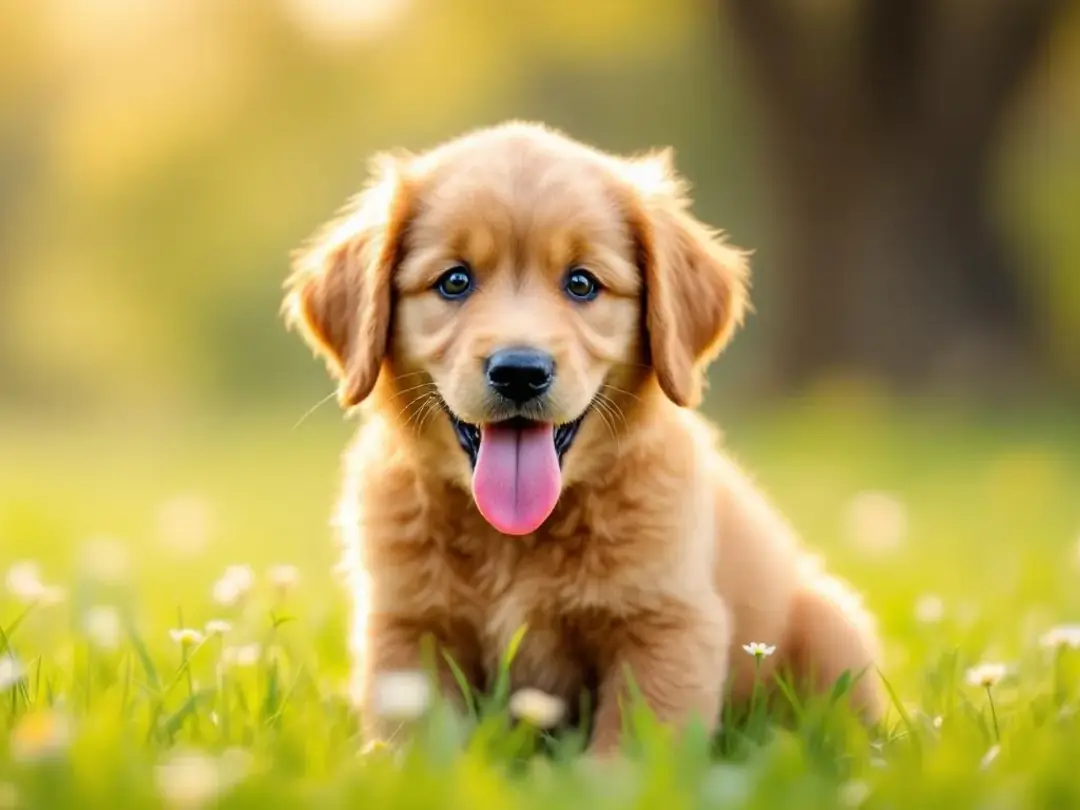Key Takeaways
-
Goldendoodles are among the cutest designer dogs, combining Golden Retriever friendliness with Poodle intelligence and hypoallergenic coats
-
Mini Goldendoodles with wavy or curly coats are often considered the most teddy bear-like and adorable
-
These dogs come in various sizes (toy, miniature, medium, standard) and coat colors including apricot, cream, chocolate, black, and red
-
F1B and F1BB generations tend to have curlier, more hypoallergenic coats that enhance their cute, fluffy appearance
-
Proper grooming and early socialization are essential to maintain their adorable looks and sweet temperament
Introduction to Goldendoodles
Goldendoodles are the ultimate designer breed, winning over pet owners with their irresistible blend of charm, intelligence, and minimal shedding. Created by crossing a golden retriever with a poodle, these dogs inherit the best qualities of both parent breeds. The golden retriever brings a gentle, friendly personality, while the poodle contributes smarts and a low-shedding, often hypoallergenic coat. This combination makes goldendoodles a top choice for families, allergy sufferers, and anyone looking for an adorable companion with a loving personality. With their playful spirit and endearing looks, it's easy to see why goldendoodles have become one of the most sought-after breeds among dog lovers everywhere.
What Makes Goldendoodles So Irresistibly Cute
The secret to goldendoodle cuteness lies in their perfect blend of parent breeds. These adorable pups inherit the warm, expressive eyes of golden retrievers paired with the elegant features of poodles, creating faces that seem to radiate friendliness and intelligence. Doodles, as a group, are celebrated for their unique blend of physical and personality traits, with goldendoodles standing out for their charming combination of both. Their round skulls, broad muzzles, and drop ears give them an eternally youthful appearance that melts hearts instantly.
The teddy bear appearance comes from their unique coat genetics. Most goldendoodles develop wavy to curly coats that maintain a perpetually groomed, fluffy look even between professional grooming sessions. This fur texture creates the illusion of a living stuffed animal, especially in mini goldendoodle varieties where the compact size enhances the toy-like appeal.
Their friendly facial expressions, inherited from golden retriever genetics, make them appear constantly happy and approachable. Unlike some breeds that can look stern or aloof, goldendoodles naturally carry a gentle, welcoming expression that immediately signals their loving nature. This visual friendliness, combined with their actual temperament, creates an irresistible package that appeals to pet owners of all ages.
The playful, gentle demeanor of these dogs shines through in their appearance and body language. Even adult goldendoodles maintain a youthful bounce in their step and an eager-to-please expression that keeps them looking perpetually young. Compared to other breeds, goldendoodles often stand out for their friendly expressions and approachable demeanor, making their cuteness and personality especially appealing. This combination of physical features and personality traits creates the perfect storm of canine cuteness that has made goldendoodles one of the most photographed and shared dog breeds on social media.
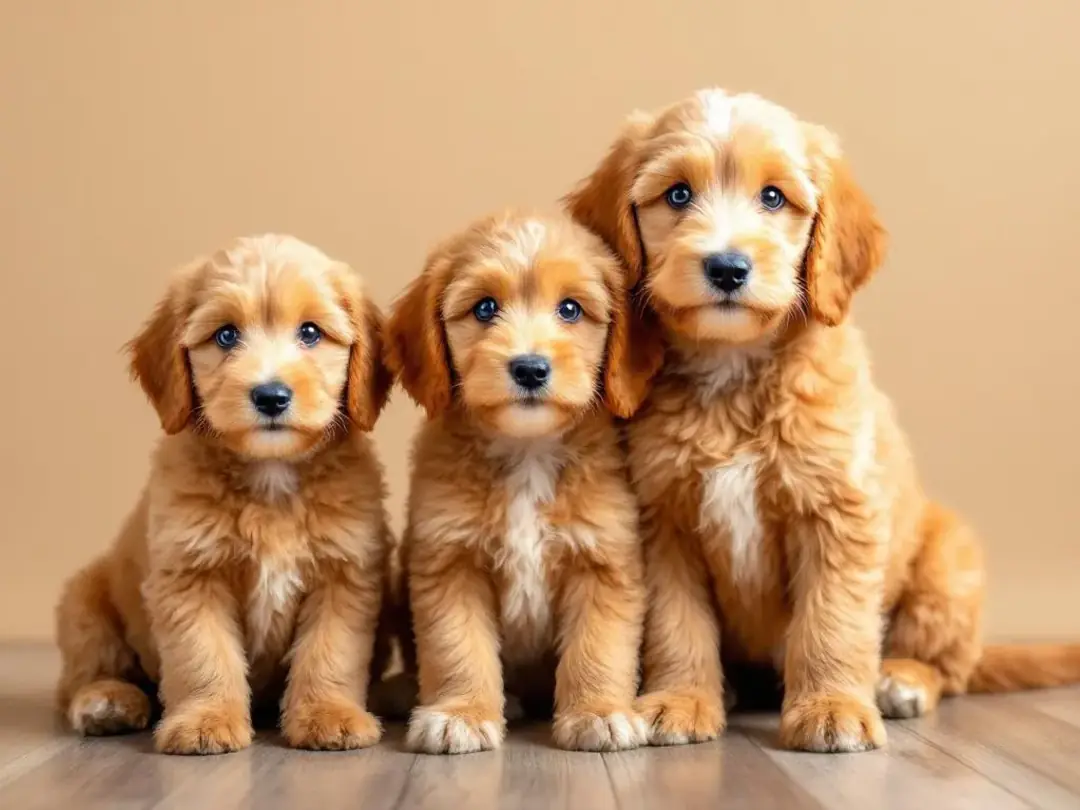

The Cutest Goldendoodle Sizes and Types
Size plays a crucial role in determining just how cute your goldendoodle will be, with each variety offering its own unique appeal. Toy goldendoodles, weighing between 10-25 pounds, represent the ultimate in portable cuteness. These pint-sized pups maintain all the adorable features of their larger cousins while fitting perfectly in your lap, making them ideal apartment living companions with maximum snuggle factor.
Miniature goldendoodles, ranging from 25-45 pounds, strike the perfect balance between cuddliness and practicality. They're large enough to be excellent family dogs for children while remaining small enough to maintain that irresistible teddy bear appearance well into adulthood. Many pet owners find this size ideal because these dogs can still curl up on furniture while being sturdy enough for active play.
Medium goldendoodles, weighing 45-60 pounds, offer the best of both worlds for families wanting a substantial pet that retains adorable features. These dogs maintain the fluffy, approachable appearance of smaller varieties while providing the gentle giant appeal that many families love. Their size makes them excellent therapy dogs for nursing homes and hospital patients, where their calm presence and adorable appearance provide comfort.
Standard goldendoodles, ranging from 60-90 pounds, prove that cuteness doesn't diminish with size. These gentle giants maintain the same expressive eyes, fluffy coats, and friendly demeanor as their smaller relatives. Their impressive size paired with their soft, approachable appearance creates a striking contrast that many find irresistibly charming. Compared to other doodles, goldendoodles offer a wide range of sizes and looks, but other doodles also come in various sizes and traits, giving prospective owners even more options to find the perfect fit for their family.
Generation also impacts cuteness factors significantly. F1B goldendoodles (75% poodle genetics) tend to have curlier, fluffier coats that enhance their teddy bear appearance. F1BB generations push this even further, often resulting in extremely curly, hypoallergenic coats that photograph beautifully and maintain their shape longer between grooming sessions. These generations are particularly popular among allergy sufferers who don't want to compromise on adorability.
Doodle Dog Varieties: Exploring the Adorable Mixes
The doodle dog world is full of delightful possibilities, each mix offering its own unique charm. Goldendoodles, for example, are just one of many adorable breeds created by crossing poodles with other beloved dogs. Labradoodles (Labrador Retriever and Poodle), Bernedoodles (Bernese Mountain Dog and Poodle), and even Shih-Poos (Shih Tzu and Poodle) are all part of this growing family of designer dogs. The mini goldendoodle, a cross between a golden retriever and a miniature poodle, is especially popular with pet owners who want a smaller dog perfect for apartment living. On the other hand, standard goldendoodles-born from golden retrievers and standard poodles-are ideal for families with more space and an active lifestyle. With so many doodle breeds to choose from, there's a perfect match for every owner, whether you're drawn to the playful personality of a labradoodle or the compact cuteness of a mini goldendoodle.
Teddy Bear Goldendoodles: The Ultimate in Cuteness
If you're searching for the epitome of adorable, look no further than the Teddy Bear Goldendoodle. These dogs are famous for their plush, curly coats and sweet, rounded faces that make them look just like living teddy bears. Their hypoallergenic coat is a huge bonus for allergy sufferers, and while it does require regular grooming to keep it soft and tangle-free, the minimal shedding makes them a favorite among families. Teddy Bear Goldendoodles are known for their gentle, affectionate nature, making them wonderful pets for children and adults alike. Whether they're snuggling on the couch or playing in the yard, these lovable pups bring joy and comfort to every home they join.
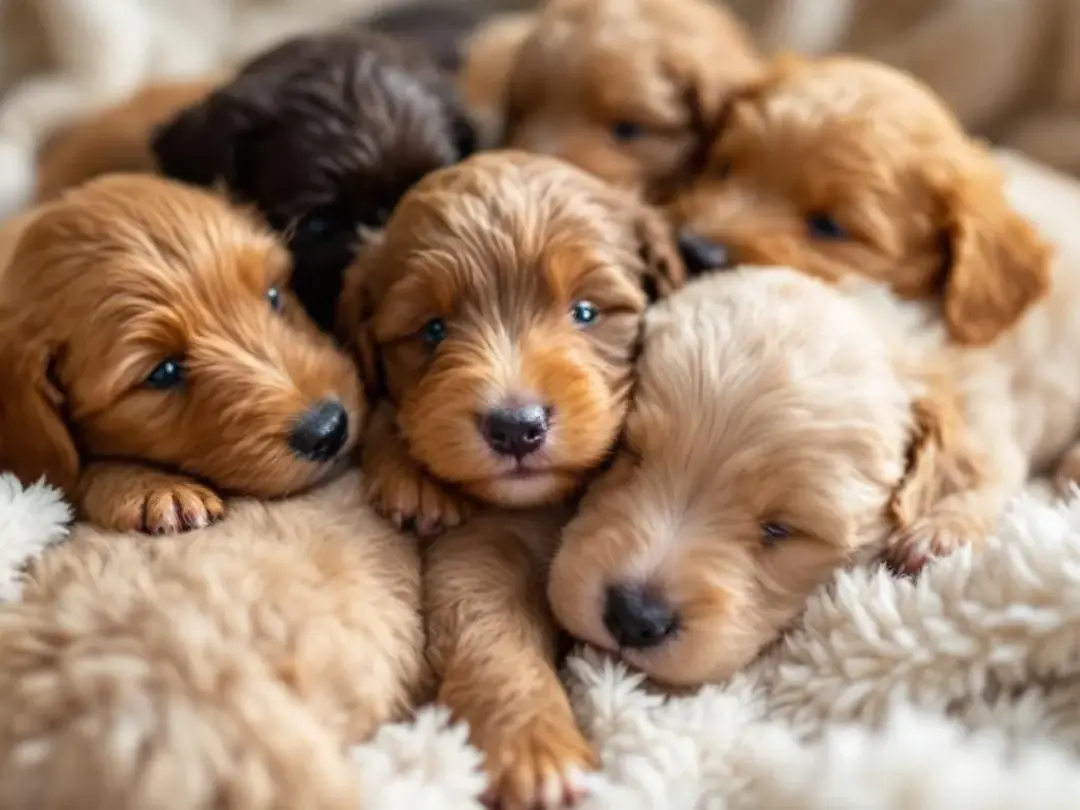

Most Adorable Goldendoodle Coat Colors and Patterns
Color dramatically impacts the perceived cuteness of goldendoodles, with certain hues naturally enhancing their teddy bear qualities. Apricot and cream goldendoodles represent the classic teddy bear colors that most people envision when thinking of these adorable pups. These warm, golden tones highlight their friendly features and photograph beautifully in any lighting, making them social media favorites.
Chocolate and red goldendoodles offer rich, warm tones that create stunning visual contrast with their dark eyes and nose. These colors tend to photograph exceptionally well, with the deep hues adding sophistication while maintaining the breed's inherent cuteness. Red goldendoodles, in particular, often fade to lighter shades over time, creating unique color variations that many owners find charming.
Black and gray goldendoodles provide striking contrast colors that make their expressive eyes and facial features pop dramatically. While less common than golden tones, these darker colors create an elegant appearance that many find irresistibly sophisticated. Gray goldendoodles, especially those with blue undertones, offer a unique twist on traditional colors that stands out in any crowd.
Parti patterns, featuring 50% or more white combined with another color, create visually interesting markings that add character without diminishing cuteness. These patterns often include adorable facial markings that frame the eyes or create unique "eyebrow" effects. Tuxedo patterns, with white chest and paw markings against darker bodies, give goldendoodles a formally dressed appearance that many find endearing.
It's important to note that coat fading affects long-term appearance and cuteness. Many goldendoodle puppies start with vibrant colors that lighten significantly during their first two years. While this fading might seem disappointing initially, most owners find the softer, mature colors equally charming and often more versatile for family photos and everyday life.
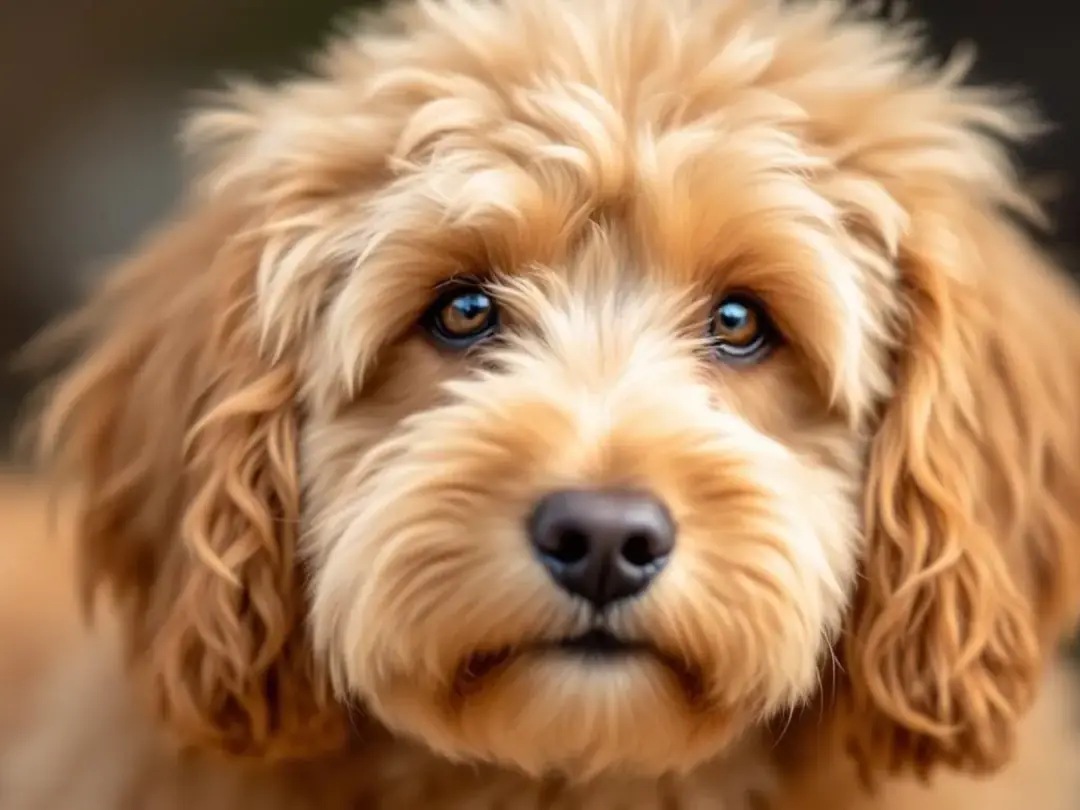

Coat Textures That Maximize Cuteness
Coat texture plays perhaps the most significant role in determining a goldendoodle's overall cuteness factor. Wavy coats represent the most common and universally appealing texture, creating that perfect "just been groomed" look that stays manageable between professional appointments. This texture provides enough curl to maintain fluffiness while remaining soft enough for endless snuggling sessions.
Curly coats offer maximum fluffiness and that coveted poodle-like appearance that many consider the epitome of goldendoodle cuteness. These coats maintain their shape exceptionally well, creating consistent teddy bear proportions that photograph beautifully from every angle. The curly coat texture also provides the best hypoallergenic benefits, making these dogs ideal for allergy sufferers who refuse to compromise on adorability.
Straight coats, while less common, offer a sleek appearance that showcases the golden retriever influence while maintaining the breed's friendly features. These coats tend to be lower maintenance than their curlier counterparts while still providing the soft, touchable quality that makes goldendoodles such excellent snuggle companions.
Understanding how coat texture affects grooming and maintenance helps preserve that adorable appearance. Curly coats require more frequent brushing to prevent matting but maintain their cute shape longer. Wavy coats offer the best balance of cuteness and manageability, while straight coats provide easy care with a different but equally charming aesthetic.
Identifying coat type in young goldendoodle puppies helps predict future cuteness potential. Puppy coats often appear straighter than they'll become in adulthood, with true texture emerging around 6-12 months. Poodle genetics typically become more pronounced during this transition, often resulting in increased curliness that enhances the teddy bear appearance many owners desire.
Hybrid Vigor Benefits: Why Designer Dogs Shine
One of the standout advantages of goldendoodles is their hybrid vigor-a term that describes the enhanced health and vitality seen in dogs bred from two different parent breeds. By combining the golden retriever and poodle, goldendoodles often inherit the best qualities from both sides: excellent health, a low-shedding coat, and a friendly, intelligent temperament. This hybrid vigor means goldendoodles are less likely to suffer from some of the hereditary issues that can affect purebred dogs, making them a smart choice for pet owners who want a robust, happy companion. Their versatility also shines through, as goldendoodles excel as family pets, therapy dogs, and even working dogs. With their unique blend of traits, it's no wonder goldendoodles are celebrated for their loving nature, adaptability, and overall excellence as a designer breed.
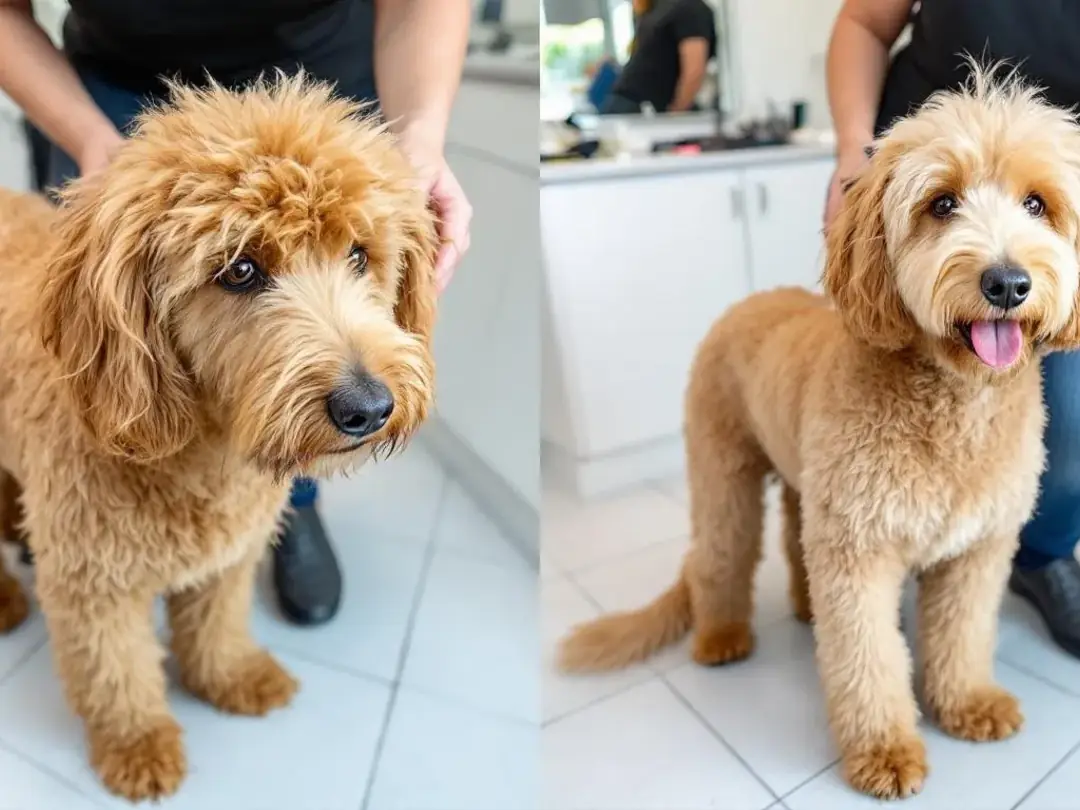

Maintaining Your Goldendoodle's Adorable Appearance
Regular grooming schedules form the foundation of maintaining your goldendoodle's peak cuteness. Daily brushing prevents matting while keeping that fluffy, touchable texture that makes these dogs so irresistible. Focus on high-friction areas like behind the ears, under the collar, and around the legs where tangles form most quickly.
Professional grooming every 6-8 weeks maintains optimal cute factor while ensuring your dog's comfort and health. The timing depends on coat type - curly coats may need attention every 6 weeks, while wavy coats can often go 8 weeks between appointments. Regular grooming also allows professionals to maintain proper coat shape and address any developing issues before they become problems.
Choosing the right grooming style dramatically impacts your goldendoodle's appearance. Puppy cuts maintain a uniform, youthful look that emphasizes cuteness across all ages, while teddy bear cuts focus on creating that rounded, stuffed animal appearance around the face and body. Face trimming techniques that enhance expressive eyes while maintaining fluffy cheek hair create the most photogenic and adorable results.
Starting grooming routines early creates well-behaved, cute adult dogs who actually enjoy their beauty sessions. Introduce brushing, nail trimming, and ear cleaning during puppyhood using positive reinforcement and patience. Dogs who associate grooming with treats and praise are more likely to cooperate during professional appointments, resulting in better cuts and happier experiences for everyone involved.
Nail trimming and ear cleaning contribute significantly to overall cute presentation. Short nails prevent clicking sounds and maintain proper foot shape, while clean ears prevent infections that could affect your dog's comfort and appearance. These basic maintenance tasks, while not glamorous, form the foundation of keeping your goldendoodle looking and feeling their absolute best.
Cutest Goldendoodle Puppy Development Stages
The 8-12 week period represents peak puppy cuteness, when goldendoodle puppies sport their fluffy baby coats and exhibit maximum playfulness. During this stage, puppies display the rounded features, oversized eyes, and soft coat texture that trigger our strongest protective instincts. This is often when families fall hardest for their future pet, as the combination of helplessness and overwhelming cuteness proves irresistible.
The 3-6 month coat transition period brings exciting changes as puppy fur gives way to adult texture. While some owners worry about losing that baby fluff, this stage often reveals the true personality and adult coat potential of each individual dog. Documenting this transition through puppy photos creates lasting memories of your goldendoodle's transformation from baby to adolescent.
The 6-12 month adolescent stage challenges some owners as their adorable puppy grows into gangly teenage proportions. However, this stage also reveals the emerging adult personality and coat characteristics that will define your dog's long-term appearance. Many goldendoodles experience a second "cute phase" during this period as their adult features begin harmonizing into their final form.
Mature coat development at 12+ months showcases your goldendoodle's final adult appearance, often surprising owners with increased curliness or color changes they didn't expect. This stage represents the culmination of genetic expression from both parent breeds, creating the unique combination of traits that will characterize your dog throughout their adult life.
Socialization during these cute puppy stages significantly affects adult temperament and behavior. Well-socialized goldendoodle puppies grow into confident, friendly adults whose personalities enhance their natural physical appeal. Proper exposure to people, other dogs, and various environments during peak cuteness periods helps ensure your adorable puppy becomes an equally charming adult dog. Additionally, the qualities and health of the parents play a crucial role in determining a goldendoodle puppy's size, coat, and temperament, so understanding the parentage can help predict what to expect as your puppy matures.
Personality Traits That Add to Goldendoodle Cuteness
The gentle, friendly nature of goldendoodles shows clearly in their facial expressions and body language, adding immeasurably to their visual appeal. These dogs naturally carry themselves with confidence while maintaining an approachable demeanor that invites interaction. Their expressions seem to convey intelligence, warmth, and eagerness to please - qualities that enhance their physical attractiveness significantly.
Playful energy creates countless opportunities for adorable action shots and candid moments that showcase goldendoodle personality. Whether chasing toys, playing with children, or simply exploring their environment, these dogs move with enthusiasm and joy that's infectious to watch. Their athletic abilities, combined with their friendly nature, make them naturally photogenic in almost any situation.
Intelligence leads to cute, responsive behaviors that strengthen the bond between goldendoodles and their families. These smart dogs quickly learn routines, tricks, and commands that allow them to participate more fully in family life. Goldendoodles are also easy to train, which makes them even more suitable as adorable and well-behaved companions. Their ability to read human emotions and respond appropriately makes them excellent companions whose personalities complement their adorable appearance.
The affectionate temperament perfect for cuddling creates countless bonding opportunities that many pet owners treasure. Goldendoodles typically enjoy physical contact, making them ideal snuggle companions who seem to understand exactly when their humans need comfort. This loving nature, combined with their soft coats and perfect cuddling size, creates an irresistible combination.
Therapy dog potential emerges naturally from goldendoodles' calm, cute presence and intuitive understanding of human needs. Many of these dogs work successfully in nursing homes, hospital patients, and other therapeutic settings where their combination of adorable appearance and gentle temperament provides comfort to people facing difficult circumstances. Proper training enhances these natural qualities, allowing goldendoodles to share their special brand of cuteness with those who need it most.
Finding the Cutest Goldendoodle for Your Family
Choosing reputable breeders prioritizing health and temperament ensures you'll find a goldendoodle whose cuteness comes from good genetics rather than just good marketing. Research breeders who perform health testing on parent breeds, provide health clearances, and focus on producing well-socialized litters. The cutest goldendoodle is ultimately one that's healthy, well-bred, and properly cared for from birth.
Evaluating litters for coat type and color preferences helps match your aesthetic desires with available puppies. However, personal preference plays a significant role in choosing the cutest goldendoodle, whether based on gender, size, or coat type. Remember that puppy coats often change significantly during the first year, so focus more on overall health, temperament, and breeder reputation than specific appearance details that may evolve over time.
A temperament test is a valuable tool for identifying the sweetest and most compatible goldendoodle puppies whose personalities will enhance their natural cuteness throughout their lives. Look for puppies that are curious but not overly aggressive, friendly but not attention-desperate, and confident but not pushy. The right puppy will show interest in interaction while respecting boundaries - qualities that translate into adorable, well-behaved adult dogs.
Health clearances ensure long-term cuteness and wellbeing by reducing the risk of genetic issues that could affect your dog's quality of life. Reputable breeders test parent breeds for hip dysplasia, elbow dysplasia, eye conditions, and other hereditary concerns common to golden retrievers and standard poodles. Healthy dogs maintain their adorable appearance and playful personalities throughout longer, happier lives.
Avoiding puppy mills protects both individual dogs and the breed's reputation while ensuring you get a truly adorable, well-socialized companion. Puppy mills prioritize profit over health and temperament, often producing goldendoodle puppies with behavioral and health issues that diminish their cuteness and companionship potential. Always visit breeding facilities, meet parent dogs when possible, and trust your instincts about breeder ethics and practices.
Questions to ask breeders about coat development and adult appearance help set realistic expectations while identifying breeders who truly understand goldendoodle genetics. Ask about poodle parent coat testing, previous litter outcomes, and expected adult size ranges. Knowledgeable breeders will discuss coat genetics honestly while providing examples of previous litters to demonstrate their typical results.
Capturing Your Goldendoodle's Cuteness
Natural lighting showcases goldendoodle coats and expressive eyes most effectively, avoiding harsh shadows that can hide their adorable features. Outdoor photos during golden hour create warm, flattering light that enhances coat colors while bringing out the sparkle in their eyes. Window light provides excellent indoor alternatives when outdoor photography isn't practical.
Photographing at your goldendoodle's eye level creates more engaging, intimate photos that showcase their personality alongside their physical appeal. Get down on the ground to capture their perspective and create more dynamic compositions that highlight their expressive faces and body language.
Action shots capturing playful, adorable moments often become treasured family favorites that showcase both cuteness and personality. Be ready with your camera during play sessions, training time, or quiet bonding moments when your goldendoodle's natural charm shines brightest. Burst mode helps capture the perfect expression during active play or spontaneous cute behaviors.
Seasonal photo opportunities with appropriate props and settings create memorable images while celebrating your goldendoodle's year-round adorability. Spring flowers, summer beach scenes, autumn leaves, and winter snow all provide beautiful backdrops that complement different coat colors and create variety in your photo collection.
Social media success comes from consistency, authenticity, and timing rather than just cute photos. Share a mix of adorable posed shots, candid moments, and behind-the-scenes glimpses of life with your goldendoodle. Engage with other doodle owners and pet-loving communities to build connections and share the joy these amazing dogs bring to our lives.
Creating lasting memories requires intentional documentation of your goldendoodle's most adorable phases throughout their life. From puppyhood through their senior years, these dogs offer countless opportunities for beautiful photos and cherished memories. Regular photo sessions help track their growth while preserving the unique charm of each life stage.
The cutest goldendoodles combine exceptional genetics, proper care, and loving families who appreciate their unique blend of beauty and personality. Whether you're drawn to the compact cuteness of a mini goldendoodle or the gentle giant appeal of a standard, these remarkable dogs offer something special for every family. Their combination of hypoallergenic coats, friendly temperaments, and undeniable adorability makes them ideal companions for families seeking both beauty and substance in their four-legged family members.
Remember that the cutest goldendoodle is ultimately one that's healthy, well-socialized, and loved. Focus on finding a reputable breeder, providing excellent care, and nurturing the special bond that makes these dogs such treasured family members. With proper attention to grooming, training, and socialization, your goldendoodle will maintain their adorable appeal while developing into the loving companion that makes this designer breed so incredibly special.
FAQ
Which Goldendoodle generation is the cutest?
F1B and F1BB generations often have the curliest, most teddy bear-like coats that many consider the cutest, though cuteness is subjective and all generations can be adorable. These generations have higher poodle genetics (75% and 87.5% respectively), resulting in fluffier, more hypoallergenic coats that maintain their shape well between grooming sessions.
Do Goldendoodles stay cute as adults?
Yes, Goldendoodles maintain their adorable appearance throughout their lives, though their coat texture may change from puppy to adult coat between 6-12 months of age. Many owners find their dogs become even more beautiful as adults when their final coat texture and color settle into their permanent form.
What's the difference between cute male and female Goldendoodles?
Both genders are equally cute, though males tend to be slightly larger and may have more robust features, while females often have more delicate facial features. Personality differences are typically more pronounced than physical ones, with males often being more outgoing and females sometimes more reserved, though individual variation is significant.
How can I keep my Goldendoodle looking as cute as possible?
Regular grooming every 6-8 weeks, daily brushing, proper nutrition, and maintaining a healthy weight will keep your Goldendoodle looking their cutest throughout their life. Starting grooming routines early and using positive reinforcement helps ensure your dog enjoys the process and cooperates for better results.
Are smaller Goldendoodles cuter than larger ones?
Cuteness is subjective, but many people find mini and toy Goldendoodles especially adorable due to their compact, teddy bear-like size and proportions. However, standard Goldendoodles have their own appeal as gentle giants with impressive fluffy coats, and medium sizes often provide the best balance of portability and family-friendly characteristics.

